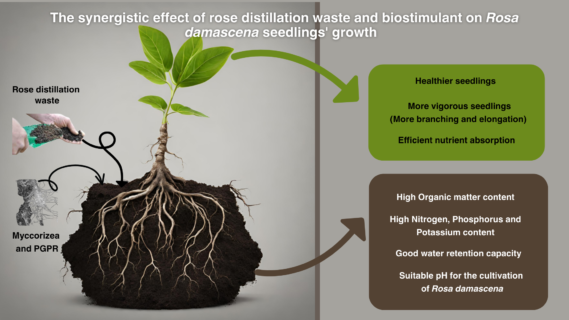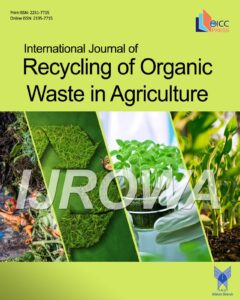Exploring the synergistic effect of rose distillation waste and biostimulant beside other organic amendments onRosa damascena seedlings’ growth
Authors
-
Soumia El Malahi
*
 1, 2
1, 2
- Lahcen Irahoui 2
- Wafaa Mokhtari 3
- Mounia Ennami 4
- Houda Taimourya 4
- Jamaa Zim 3
- Abdallah Zayani 5
- Bahija Zakeri 2
- Khalid Dhassi 6
- Mimoun Mokhtari 2
- Lalla Mina Idrissi Hassani 1
Abstract
Purpose: Floral waste, as a frequently overlooked resource for sustainable agriculture, can be harnessed to produce nutrient-rich soil amendments resulting in an enhancement of soil fertility and augment crop yields. This in turn can foster a circular economy, minimizing waste disposal and promoting a green economy. This study was aimed to explore the potential of rose distillation waste and other organic amendments as sustainable alternatives to traditional synthetic chemicals, particularly in the context of rose production.
Method: The data was collected experimentally in a controlled greenhouse condition. A complete randomized block design with three replicates was applied to conduct the experimental units. The study investigated the combined effects of three organic amendments: goat manure rose distillation waste, and compost, as well as a bio-stimulant containing both Mycorrhizae and Plant Growth Promoting Rhizobacteria. Several parameters, including growth traits and leaves nutrient content, were assessed.
Results: Rose distillation waste proved to be a promising organic amendment with a significant positive effect on the growth and development of seedlings. Rose distillation waste substrate showed a remarkable increase in terms of leaf area and a maximum apical internode growth of 1.5 mm. The incorporation of bio-stimulant in the rose distillation waste substrate resulted in significant stem height growth of 11.3 cm and a high bud break rate of 73.3%.
Conclusion: The findings of the study offer valuable insights into the sustainable management of rose production. The use of rose distillation waste as an organic amendment not only enhances plant growth but also positively impacts nutrient content in leaves. This highlights the potential of rose distillation waste as a sustainable and easily available resource for use in organic agriculture.
Highlights
- Rose distillation waste is reutilized as a sustainable soil amendment, enhancing soil fertility and bolstering crop yields, contributing to a more eco-friendly and circular economy.
- Both rose distillation waste and organic amendments are proven to be effective alternatives to synthetic chemicals in the cultivation of roses.
- Experiments conducted in greenhouses demonstrate significant growth advantages when combining rose distillation waste with a biostimulant rich in Mycorrhizae and Plant Growth Promoting Rhizobacteria.
- This study underscores the significance of employing rose distillation waste in cost-effective, sustainable, and easily accessible organic agricultural practices for rose production




